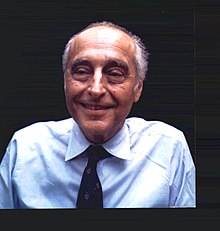Ithiel de Sola Pool
| Ithiel de Sola Pool | |
|---|---|
 |
|
| Born | October 26, 1917 |
| Died | March 11, 1984 (aged 66) |
| Nationality | American |
| Institutions | Massachusetts Institute of Technology |
| Alma mater | University of Chicago |
| Doctoral advisor | Harold Lasswell |
| Known for | Research on technology and societal impact |
| Spouse | Judith Graham Pool (1938-1953, divorce) |
| Children |
|
Ithiel de Sola Pool (October 26, 1917 – March 11, 1984) was a revolutionary figure in the field of social sciences. Pool led groundbreaking research on technology and its effects on society. He coined the term "convergence" to describe the effect of various scientific innovations on society in a futuristic world. In the course of his career, he would make startlingly accurate predictions about technology and society. In Pool's 1983 book, Technologies of Freedom he described the modes of technology. Digital electronics present convergence between historically separated modes of communication. Theater, news events, and speaking are all increasingly delivered electronically. These modes of communicating ideas are becoming one single grand system.
De Sola Pool was the son of David de Sola Pool, the spiritual leader of the Sephardic Congregation Shearith Israel in New York City. His mother was Tamar Hirschensohn, the Palestinian daughter of Rabbi Chaim Hirschensohn. His sister was Naomi de Sola Pool, a physician.
Pool was initially educated at an Ethical Culture School in New York City. He went on to attend the University of Chicago, where he received a Bachelor of Arts in 1938, a Master of Arts in 1939, and his Ph.D. in 1952. The university was under the direction of Robert Maynard Hutchins, its president from 1929 to 1945, a period in which it became "the birthplace of modern American social sciences."
During World War II, Pool ventured to Washington, D.C., to study and research the effects of Nazi and communist propaganda under Harold Lasswell. He held several prestigious academic appointments, including Stanford University and, eventually, the Massachusetts Institute of Technology, where he joined the MIT Center for International Studies. He remained there for more than 30 years, doing research on the effects of communication technology on global politics.
...
Wikipedia
